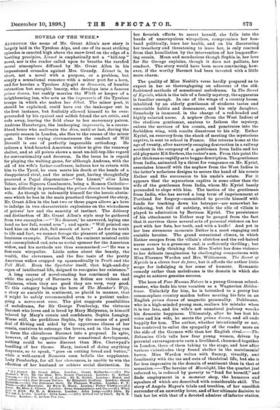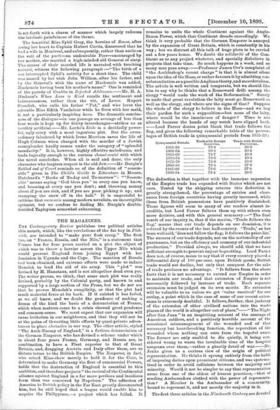NOVELS OF THE WEEK.* ALTHOUGH the scene of Mr. Grant
Allen's new story is largely laid in the Tyrolese Alps, and one of its most striking episodes is enacted high above the snow-level on the edge of a beetling precipice, Linnet is emphatically not a " hill-top " novel, nor is the reader called upon to breathe the rarefied moral atmosphere diffused by Mr. Grant Allen in his impassioned crusades against Mrs. Grundy. Linnet is, in short, not a, novel with a purpose, or a problem, but simply a sensational romance with a minor poet for a hero, and for heroine a Tyrolese Alp-girl or Sennerin, of humble extraction but seraphic beauty, who develops into a famous prima donna, but rashly marries the Wirth or keeper of a neighbouring inn, who acts as the impresario of the Tyrolese troupe in which she makes her debut. The minor poet, it should be explained, could have cut the innkeeper out in the first instance, but foolishly allowed himself to be over- persuaded by his cynical and selfish friend the art critic, and rode away, leaving the field clear to her mercenary patron. Andreas Hausberger, the innkeeping impresario, is a coarse- Shred brute who maltreats the diva, until at last, during the operatic season in London, she flies to the rooms of the minor poet. In these trying circumstances the conduct of Will Deverill is one of perfectly impeccable orthodoxy. He induces a kind-hearted American widow to give the runaway shelter, and at all points shows a most un-bill-top-like regard for conventionality and decorum. In the issue he is repaid for playing the waiting game, for although Andreas, with the aid of his wife's father-confessor, induces her to return with him to the Tyrol, he soon meets his death at the hands of a disappointed rival, and the minor poet, having thoughtfully procured a Papal dispensation—" the Linnet," alias Lina Telser, alias Signora Casalmonte, being a Roman Catholic— has no difficulty in persuading the prima donna to become his wife. As though to indemnify himself for the heroic abstin- ence which he has in the main practised throughout the story, Mr. Grant Allen in the last two or three pages allows ;a's hero to indulge in two characteristic explosions on the wickedness of priests' law and the sanctity of instinct. The delicacy and distinction of Mr. Grant Allen's style may be gathered from two examples :—" No dearest,' he answered, laying one hand on her full, round arm" ; and again : "Will printed one hard kiss on that rich, full month of hers." As for its truth to life and fact., we cannot forego the pleasure of quoting one luminous example. Florian Wood, the eminent musical critic and accomplished cad, acts as social sponsor for the American widow, and his methods are thus summarised :—" He was a first-rate wirepuller. Little notes about the beauty, the wealth, the cleverness, and the fine taste of the pretty American widow cropped up spasmodically in Truth and the Pall Mall. Even the Spectator itself, that high-and-dry organ of intellectual life, deigned to recognise her existence."
A long course of novel-reading has convinced us that while the majority of Baronets in fiction are vicious and villainous, when they are good they are very, very good. To this category belongs the hero of The Member's Wife, a story so amiable in sentiment, so placid in manner, that it might be safely recommended even to a patient under- going a nerve-rest cure. The plot suggests possibilities of melodrama, for Sir George Pemberley, the virtuous Baronet who loves and is loved by Mary Molyneux, is himself beloved by Mary's cousin and confidante, Sophia Langley. Worse still, the perfidious Sophia, by the means of a good deal of fibbing and aided by the opportune illness of her cousin, contrives to estrange the lovers, and in the long run to force the chivalrous Baronet into a proposal. In spite, however, of the opportunities for sensational development, nothing could be more discreet than Mrs. Chetwynd's handling of her theme. Mary, instead of doing anything desperate, so to speak, " goes on cutting bread and butter," while a well-earned Nemesis soon befalls the supplanter. Lady Pemberley, for all her cleverness, is unable to win the affection of her husband or achieve social distinction. In
(1.) Linnet. By Grant Allen. Loudon : Grant Itiohards.—(2.) The Member's Wife. By the Hon. Mrs. Henry Ohetwynd. London : 0. Arthur Pearson.— O.) The Secret of Kyriels. By E. Nesbit. London: Hurst and Baokett..—(4.) Poor Human Nature. By Elizabeth Godfrey. London: Grant liTquirds.—(5.) The Bohemian Girls. By Florence Warden. London: F. V. WI:rte.—{6.) Moonlight. By Mary E. Mann. London: Fisher Unwin.—(7.) Serum. Br Alice A. Olowss. London: Swan Sonnensobein and 0o.(8.) When Lore is Kind. By H. A. Binkson. London : John Long.—(9.) Idols. By IRIII J. Lecke. London John Lane.—(10.) Settled out of Court. By G. B. Burgin. London : O. Arthur Pea eon.
her feverish efforts to assert herself, she falls into the hands of unscrupulous wirepullers, compromises her hus- band politically, loses her health, and on his discovering her treachery and threatening to leave her, is only rescued from that humiliation by the intervention of her long-suffer- ing cousin. Mean and mendacious though Sophia is, her love for Sir George explains, though it does not palliate, her conduct. The story would have been more convincing, how- ever, if the worthy Baronet had been invested with a little more charm.
The quality of Miss Nesbit's verse hardly prepared DB to expect in her so thoroughgoing an adherent of the old- fashioned methods of sensational melodrama. In The Secret of Kyriels, which is the tale of a family mystery, the apparatus is familiar enough. In one of the wings of a country house, inhabited by an elderly gentleman of studious tastes and unsociable habits and demeanour, and his only daughter, Somebody is immured, in the charge of a red-headed and highly salaried nurse. A nephew (from the West Indies) of the studious gentleman, anxious to fathom the mystery, enlists the services of his cousin, and penetrates into the forbidden wing, with results disastrous to his ally. Esther Kyriel, on recovery from the shock of meeting the mysterious captive, is sent to school in France. She returns home at the age of twenty, after narrowly escaping destruction in a railway accident in the company of a. gentleman from India and her old playmate Kit Snrtees,the rector's son. From this point the plot thickens so rapidly as to beggar description. The gentleman from India, animated by a thirst for vengeance on Mr. Kyriel, associates himself with the nephew from the West Indies in the latter's nefarious designs to secure the hand of his cousin Esther and the succession to his uncle's estate. For it appears that the mysterious captive is none other than the wife of the gentleman from India, whom Mr. Kyriel basely persuaded to elope with him. The tactics of the gentleman from India, who has served a long term of imprisonment at Portland for forgery—committed to provide himself with funds for tracking down his betrayer—are somewhat be- wildering, but fall of subtlety, while the role of villain is played to admiration by Bertram Kyriel. The persistence of his attachment to Esther may be ganged from the fact that it survives three several acts of personal violence on her part with her fists, her teeth, and with a knife ! And yet in her less strenuous moments Esther is a most engaging and amiable heroine. The grand sensational climax, in which Esther escapes from the villain's clutches and the red-haired nurse comes to a gruesome end, is sufficiently thrilling ; but we cannot help thinking that Miss Nesbit has done violence to her delicate imagination by challenging comparisons with Miss Florence Warden and Mrs. Williamson. The Secret of Kyriels is a clever tour de force, but it affords the author little scope for indulging in her sense of humour. Romantic comedy rather than melodrama is the domain in which she ought to achieve genuine success.
The hero of Poor Human Nature is a young German school- master, who finds his true vocation as a Wagnerian Heiden- tenor. Unluckily for him, he is betrothed to a pretty but commonplace country maiden before meeting his fate in an English prima donna of magnetic personality. Dahlmann, who is a high-minded young man, realises his mistake when it is too late, and his wife's not unnatural jealousy wrecks his domestic happiness. Ultimately, after he has lost his voice and his wife, he meets the prima donna, and all ends happily for him. The author, whether intentionally or not, has contrived to enlist the sympathy of the reader more on the side of the German wife than her English rival.—The Bohemian Girls tells how four young women, driven by parental extravagance to earn a livelihood, chummed together in London, three of them taking to the stage, and how after various vicissitudes they found shelter in the matrimonial haven. Miss Warden writes with fluency, vivacity, and familiarity with the ins and outs of theatrical life, but she it far less impressive in the domain of sentiment than in that of sensation.—The heroine of Moonlight, like the quartet just referred to, is reduced by poverty to "fend for herself," and finds employment in a monster shop, the humours and squalors of which are described with considerable skill. The story of Angela Mayes's trials and troubles, of her unselfish surrender of an unworthy lover, and of her ultimate decision to link her lot with that of a devoted admirer of inferior station,
is set forth with a charm of manner which largely redeems the intrinsic painfulness of the theme.
The beautiful Miss Sybil Gray, the heroine of Senex, after losing her heart to Captain Hubert Curtis, discovered that he bad a wife in Montreal, and subsequently, rather than smile on the snit of the parti—an undesirable Peer—encouraged by her mother, she married a high-minded old General of sixty. The course of their married life is narrated with touching naiveté, witness the following paragraph :—" The birth of a son interrupted Sybil's activity for a short time. The child was named by her wish John William, after his father, and by the General's wish the name of Mackenzie was added, Mackenzie having been his mother's name." One is reminded of the parody of Crabbe in Rejected Addresses.—Mr. H. A. Hinkeon's When Love is Kind recalls the sentiment and boisterousness, rather than the wit, of Lever. Rupert Standish, who calls his father "Pat," and who loves the adorable Miss Edith Vandaleur while he flirts with her maid, is not a particularly inspiring hero. The dramatic concise- ness of the dialogue—in one passage an average of less than four words is kept up for thirty interchanges—strikes us as terribly artificial.—Mr. Locke's Idols is a decidedly power- ful, ugly story with a most ingenious plot. But the extra- ordinary falsehood by which Irene Merriam saves the life of Hugh Colman when charged with the murder of a Jewish moneylender hardly comes under the category of " splendid mendacity." It is, however, highly effective melodrama, and leads logically enough to the curious chassg-croise with which the novel concludes. When all is said and done, the only character who inspires respect is the old Jew.—Mr. Burgin's Settled out of Court reminds us of the definition of "season- able " given in The Child's Guide to Literature in Messrs. Hatchard's "Books of To-day and To-morrow" : " 'Season- able ' means saying God bless yon' to every one you know, and beaming at every one you don't ; and throwing money about if you are rich, and if you are poor, picking it up; and stamping the snow Off in the hall." It is ungrateful to criticise that rara avis among modern novelists, an incorrigible optimist, but we confess to finding Mr. Burgin's double- distilled Tapleyism somewhat exhausting.











































 Previous page
Previous page